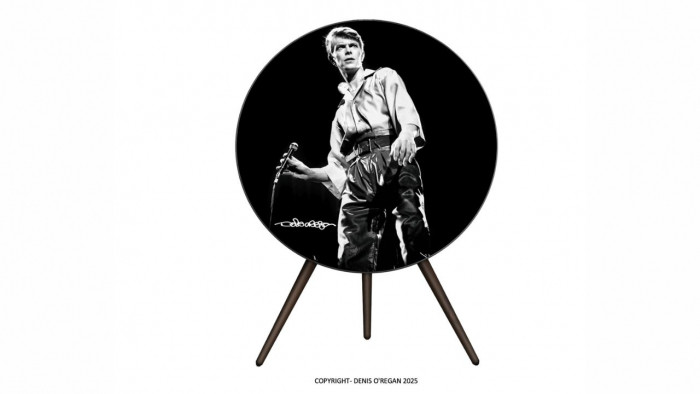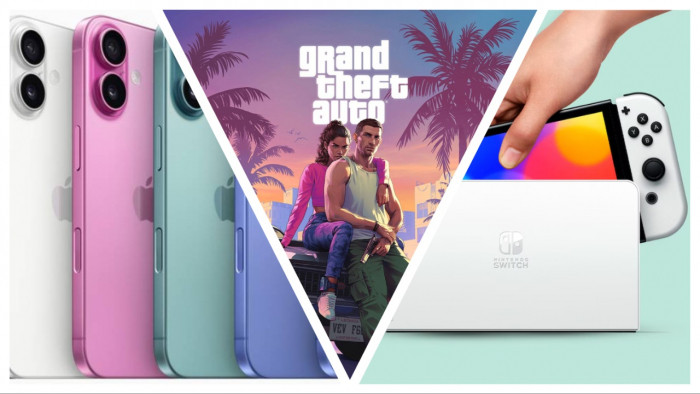Green and turquoise lights rotate around the 50,000 sq ft hall. On three colossal screens behind the stage, green Tetris-esque rectangles extend, contract, then consume themselves on an infinite loop. The bass in the music pumping through the space throbs incongruously – it is 9.45am, after all, but the visual aesthetic feels like at any second Daft Punk might rise up to a raucous cheer through a cloud of dry ice to tear this place apart.
Instead, the long-awaited 10am arrives and a man wearing a familiar grey T-shirt, dark-blue jeans and grey Nikes bounces on to the stage. He waves self-consciously at the crowd like a child who has just won a junior spelling bee. The man is the fifth richest person in the world. He is a Messiah with a bad haircut. He is Mark Zuckerberg.
I am here in San Jose to see Facebook up close. Today, Zuckerberg and his colleagues are extolling the virtues of virtual reality, a technology into which Facebook – which owns Oculus, the biggest name in VR – is pouring hundreds of millions of dollars. It’s a development that Facebook is peddling like a Jehovah’s Witness hawking the Promised Land. We are told in the introductory video that this is our “invitation to the inevitable”. Facebook’s VP of VR, Hugo Barra, says of the technology: “Once you feel it, there’s no going back. You know it’s the future, and that’s why we’re here.”
And Zuckerberg himself? After the awkward crowd-rousing, he is like a man who hasn’t just seen the light, he’s fallen in love with it. “Whenever people say that we’re building virtual reality because we’re not satisfied with the one we live in,” Zuckerberg says, “my answer is: of course we are. And that’s a good thing.”

Inside the weird world of Facebook HQ
The language in the hall – “Stand at the shore of infinite possibility”, “Imagining the world as it could be”, “Looking around, I see a lot of familiar faces” – positions the event somewhere between a sermon at a US mega-church and an AA meeting. We are being invited both to be better and to be saved. The implication at every turn is that someone who shuns VR – a technology that will only become increasingly synonymous with Facebook – is someone who will be swept under by the current of progress.
Progress always looks peculiar at the outset, and VR is no exception. Upstairs, in a sprawling hall where people – largely men – queue to don headsets for a demo, there is a ‘Gear VR Lounge’ in which a dozen guys with headsets are sitting down, oblivious to the world, a look of lobotomised intensity on their faces. Watching them is disconcertingly like stepping into a nursing home. “Some people say that VR is isolating and anti-social,” Zuckerberg says. “I actually think it’s the opposite.” Looking at these men, it is easier to side with ‘some people’ than with the billionaire.
WELCOME TO FACEBOOK
Twenty miles away, at 1 Facebook Way, after traipsing around in search of the entrance for 15 minutes, I walk into Facebook HQ, a secluded collection of buildings that looks out on to East Palo Alto’s San Francisco Bay. A receptionist brimming with an enthusiasm that can only be described as quintessentially American – “Dig it!”, “Awesome!”, “WELCOME IN, GUYS!” – asks me to sign in. All over the place there is Purell refreshing gel and Aveeno moisturiser; Facebook employees, it seems, absolutely must keep their hands clean at all times.

This is just the beginning
Posters of various colours hang on the walls, bearing messages that beg to be mocked: ‘HOPE WILL NEVER BE SILENT’, ‘FORGIVE YOURSELF’, ‘YOUR LIFE IS PRECIOUS’. One employee says that being at Facebook feels like “working with every Olympic athlete in the world”. There is a Simpsons theme to the names of many of the rooms: Mr Grimes, Bort, Poochie, Snowball. Free food and drink is everywhere. (Facebook has a ‘Candy of the Month’. October’s is Caramel Apple Pops.) An apple pie sits on a counter, begging to be eaten. Even cold, it is perhaps the best apple pie I have ever tasted.
The Menlo Park site, which employs 10,000 people, feels like its own ecosystem. Employees pedal light-blue bikes around a space so large that visitors are ferried about in small buses to stop them getting lost. More than anything else, walking around the campus reminds me of being back at university, where everything was provided for you in a bubble that came to feel like a world. Work at Facebook and you want for nothing: you can make use of the on-site dental centre, bank, dry cleaners, bike repair shop and spa. You can stroll through the rooftop garden, visit the sweet shop, play table tennis and buy your own tailored trousers.
TWO BILLION PEOPLE LIKE THIS
Facebook, the blue whale of social media, has all of us right where it wants us. One minute of every five on the internet outside China is spent on the social network. Currently at two billion, the number of people using Facebook in a month is soon likely to outstrip the number of Christians on the planet. If you add to this the number of people who use WhatsApp and Instagram – both of which Facebook owns – the number is closer to three billion. Its revenue last year was £21.5bn, and it is growing at a startling rate. “And people aren’t using it less either,” writes TechCrunch’s Josh Constine. “In fact, 66% of Facebook’s monthly users return each day now compared to 55% when it hit 1 billion.”

Smile!
But Facebook does more than just harvest our attention and spoonfeed us clips of hilarious dogs. It is now in a position where it can truly shape our behaviour. If Facebook wanted to influence an election, it would be in an ideal position to do so. Its near-omnipotent reach is making it less like a tech company and more like a geopolitical force.
Compounding this impression, at the beginning of 2017 Zuckerberg began a tour of the United States in which, like a presidential candidate, he was conspicuously photographed pressing the flesh. (Despite hiring Hillary Clinton’s chief strategist, Zuckerberg has denied the ongoing tour is part of a speculative campaign bid.)
The problem with attributing the billionaire’s movements to a presidential campaign because it isn’t normal behaviour for the CEO of a social network is that Facebook isn’t like any other social network. We are deep in uncharted territory. And it is futile to say that Zuckerberg’s strange, robotic demeanour means that he could never become president. Following the election of Donald Trump, anyone could. You could become president. Mark Zuckerberg, a man who in a 2014 Facebook Q&A accidentally said, “You’re human – and I was human”, could easily become president.
The implications of Facebook’s monopoly are serious, whether good or bad, because the future that Zuckerberg dreams about almost automatically becomes the future we are given. His attachment to VR, for example, is indicative of his unchecked desire to create his vision of a utopia. He literally wants to build an alternate reality (to which only people with sufficient funds will be allowed).
WHAT NOW?
Where does Facebook go from here? “Facebook and Mark Zuckerberg are pursuing the unprecedented power of becoming the digital marketplace, public square, library, news and entertainment broadcaster for the entire globe,” explains Noam Cohen, author of the upcoming The Rise Of Silicon Valley As A Political Powerhouse And Social Wrecking Ball. “It acquires companies that could pose a challenge (Instagram, WhatsApp) and imitates and tries to crush those who won’t be bought (Snapchat).”

Probably bigger than your whole office, this
Zuckerberg would, of course, argue that Facebook is a force for global good. One of the employees we meet over lunch says that the company is extremely conscious of how its work will affect people – both internally and externally. Its global head of HR, Lori Goler, recently said: “We take our social responsibilities very seriously at every level. One of things new people will tell you is that they are surprised by how much more intense that sense of responsibility is internally relative to how it sometimes appears externally.”
And, to Zuckerberg’s credit, he talks frequently about helping to build a more inclusive world with greater access to education and local community. He gives a convincing impression of not being in it for the money and appears to sincerely believe the things he says. With his wife Priscilla he pledged in 2015 to give away 99% of his money to “public interest causes”; over the next decade they will spend $3 billion on helping to combat all diseases in their children’s lifetime.
What scares people about Facebook isn’t the belief that its founder is driven by ill will. Zuckerberg seems like a good guy. What scares people is the power the company is capable of wielding over the web and, by extension, our lives. Ambition like this, regardless of how well-intentioned it is, will always arouse suspicion. The employee giving us our tour says that no matter how much work the company does, Facebook’s work will always be 1% complete. This is frightening.
Take one of Facebook’s current works in progress: using a drone to provide internet to remote parts of the world. On the one hand, this is clearly an advance. People who never had the internet have the internet. “There are more than four billion people who need to be connected and if we can connect them, then we’ll raise hundreds of millions of people out of poverty,” said Zuckerberg.
But in India, the government rejected one such plan. Critics like Savetheinternet.in argued that it was nefarious, calling it “Zuckerberg’s ambitious project to confuse hundreds of millions of emerging market users into thinking that Facebook and the internet are one and the same”. In the same way that media organisations and advertisers are increasingly at the mercy of the social network’s algorithms, someone whose entire online world is seen through a Facebook filter only sees a curated version of events.

A selection of the slogans which adorn Facebook’s walls
When Facebook started, explains Hung Nguyen, lecturer in digital journalism at Goldsmiths, it played a very modest role in people’s lives. But now, “The way they try to predict what we want is quite alarming – and the fact that it is a secret algorithm is really worrying. Even the way they measure their success is quite questionable. Facebook has the obligation to educate people on how to use the internet properly; it’s very important for people to be aware of how to interpret and analyse what they see.”
Considering that Facebook is currently trying to weather the biggest storm in its 13-year history – the accusation that it did not do enough to prevent Russian adverts influencing the US election – it is reasonable to be concerned about the company’s influence. “It’s a new challenge for internet communities to deal with nation states attempting to subvert elections,” said Zuckerberg on 21 September in a live video from Facebook HQ. “But if that’s what we must do, we are committed to rising to the occasion.” It was another measured response to a difficult question. And, while his words may seem frustratingly vague, they are at least a public admission that the company should be improving.
Facebook has made the world a more connected place, and for many it has made it unambiguously better. At the moment we simply don’t know the cost at which this gift will come. As Noam Cohen advises, “Be careful when someone or some corporation claims to only care about you, not himself or itself.” Crucially, Facebook has no compelling incentive to change the way in which it is shaping the internet. Its principal ambition is simply to drive engagement on its own platform.
Given the staggering amount of power the social network wields, we have to hope that its rule is benevolent. Ultimately, we are being asked to take a leap of faith. Because at this point we may be too far down the Facebook rabbit hole to turn back. “It’s quite scary when you think about it,” says Nguyen. “They understand you possibly better than you understand yourself.”
(Photos: Zach Anderson)










